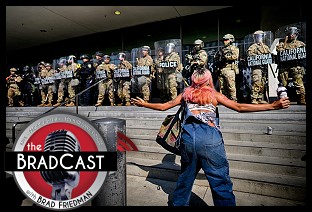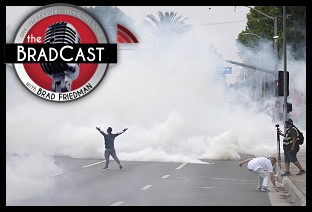 Today, in a courtroom in Philadelphia, the Pennsylvania Supreme Court held a hearing to determine whether Republican Commonwealth Court Judge Robert Simpson was correct in his verdict [PDF] last month when he stunned plaintiffs by upholding the state GOP's polling place Photo ID restriction and refusing the ACLU/Advancement Project's motion for a temporary injunction before this November's Presidential Election.
Today, in a courtroom in Philadelphia, the Pennsylvania Supreme Court held a hearing to determine whether Republican Commonwealth Court Judge Robert Simpson was correct in his verdict [PDF] last month when he stunned plaintiffs by upholding the state GOP's polling place Photo ID restriction and refusing the ACLU/Advancement Project's motion for a temporary injunction before this November's Presidential Election.
The voting rights groups are challenging the law on behalf of eight, mostly elderly, plaintiffs plus the League of Women Voters of PA and the NAACP and other civil rights groups, as a violation of the state Constitution's guaranteed right to vote. Last week, The BRAD BLOG's Ernie Canning detailed their powerful appellant's brief, arguing that Simpson erred in his ruling.
The plaintiffs had originally predicted a "slam dunk" victory in the lower court case, given the remarkably poor presentation offered by the Commonwealth, and the myriad of evidence presented in their favor, showing that some 1.6 million otherwise eligible voters could be disenfranchised this November, in addition to the state's own admission before the trial began that the Commonwealth was unaware of any "investigations or prosecutions of in-person voter fraud in Pennsylvania" and that no "in-person voter fraud is likely to occur in November 2012 in the absence of the Photo ID law."
So today's hearing was key and, according to The Nation's Ari Berman, was played out before "a packed, standing room only courtroom."
While the state Supreme Court currently consists of three Democrats and three Republicans (the fourth Republican judge on the bench is currently suspended, pending a corruption investigation), a split verdict would mean the lower court's decision to allow the GOP's restriction on voting would stand.
But there were hints today that at least one Republican judge may be skeptical about the state's claims that nobody need be disenfranchised by the GOP-enacted law which would take effect, for the first time, in the November Presidential election, just 54 days from now...
...
The six justices, three Republicans and three Democrats, saved their most aggressive questions for lawyers representing the state and Gov. Tom Corbett, a Republican who signed the law in March. A couple exchanges became testy during 80 minutes of arguments.
Justice Thomas Saylor, a Republican, questioned the state's lawyers about whether the law actually requires the state to ensure that every registered voter be able to vote, even those who cannot get a valid ID. Justice Debra Todd, a Democrat, flatly suggested the law is unconstitutional.
Justice Seamus McCaffrey, also a Democrat, pushed the state's lawyers to explain the Republican rationale used to pass the law and whether the Legislature deserves deference for its decision to pass a politically divisive law that "is now going to trample the rights of our citizens."
Berman at The Nation laid out the heart of the case presented by David Gersch, the lead lawyer for the plaintiffs...
Toward that end, Gersch offered three major facts that are central to the case: 1) Pennsylvania has already admitted in court filings that there is no evidence of in-person voter impersonation that a voter ID law would stop; 2) that hundreds of thousands of registered Pennsylvania voters do not have the new voter ID; and 3) that many of these registered voters without voter ID will have difficulty obtaining an ID, either because they can’t get, or afford, the underlying documents, like a birth certificate, needed to receive a Pennsylvania Department of Transportation (PennDOT) ID or can’t easily make it to a PennDOT office, which have limited hours and locations.
As The BRAD BLOG's Canning noted last week, and Berman explains again today, the exact number of eligible voters who may be disenfranchised by the law remains in question. While Simpson, in the lower court, disputed the plaintiff's expert who presented evidence that some 1.6 million voters may be affected, by the number's extrapolated from judge's own ruling last month, as many as 500,000 registered voters may find themselves without the requisite Photo ID now needed to vote in PA under the new law:
State Republicans argue that it's simple to obtain a "free" ID, while the plaintiffs argue that the underlying documents needed to obtain it, can cost anywhere from $20 to hundreds of dollars. Moreover, plaintiffs note, even if the hundreds of thousands of citizens lacking a driver's license are able to obtain the necessary documentation and able to find a way to get a ride to a state PennDOT office to get their ID (remember: they don't have a driver's license!), the lack of PennDOT offices available across the state and few hours they are open between now and Election Day is likely prohibitive to many.
As Berman explains:
Reading the tea leaves is a tricky business here, as was made more than clear when the lower court verdict turned out to be quite the opposite of the "slam-dunk" that plaintiffs, and even we, predicted it would be.
Berman notes that "The Democratic judges spoke frequently and asked pointed questions of the state. The Republican judges, with the occasional exception of Saylor, said almost nothing. Chief Justice Ronald Castille, who overturned the GOP’s redistricting plans and is thought to be the swing justice on the court, stayed mostly silent and appeared irritated, at times, with the outspoken Democrats."
UC Irvine law professor Rick Hasen, however, who was initially skeptical that the PA Supremes would overturn Judge Simpson's verdict, says he's more optimistic today, as based on press reports, in any case...
If the Justices want to issue a quick decision, they can reverse the preliminary injunction, pointing to the evidence of these difficulties, and not rule on the underlying question whether the law violates the state constitution once it can be fully implemented. That would have the effect of sending the case back for a full trial, followed by another eventual appeal—without the press of the election and the intense national attention.
But then, why trust what the media have to say? At least that's what one of the attorneys for the state, Alfred Putnam, tried to argue today, according to Berman.
"Putnam blamed the media for stirring fears of voter disenfranchisement. 'We don’t believe there are countless numbers out there who can’t get ID - that’s what the newspapers say!'"
Well, "the newspapers" and countless independent, non-partisan studies, including even the one by Pennsylvania's own Dept. of Transportation. But why listen to any of them?
Nonetheless, on one point, Putnam may be right. The "newspapers" should be taken with a grain of salt in many cases, particularly on this issue, as underscored yet again today by AP's pathetic he said/she said graf offering the "context" for today's hearing:
Republicans say one thing, Democrats say another! Who knows what the truth is?! Oh, yeah, the Republicans actually do know the truth, since they admitted before the case even began that they are unaware of a single instance of polling place impersonation --- the only type of voter fraud that can possibly be deterred by their polling place Photo ID restrictions --- in the history of the state.
But, far be it for AP to mention that salient point, even though one of the Justices actually read the stipulation out loud during the hearing!
So both AP and the state's attorney Putnam seem to agree on at least one point: there is no longer any basis to determine reality, despite hard facts that actually exist to prove it.
Remember what Karl Rove said way back in 2004?: "We create our own reality. And while you're studying that reality—judiciously, as you will—we'll act again, creating other new realities, which you can study too, and that's how things will sort out."
It seems both AP and Putnam agree with Rove. So now we'll just hope that at least one of the Republican jurists on the PA Supreme Court is old-fashioned enough to remain a member of the Reality Based Community and overturn this blatant attempt at voter suppression, no matter what name you use to describe it.
A verdict in the state case is expected some time this month. Separately, a federal challenge to the law may be filed by the U.S. Dept. of Justice which is currently investigating the law as a possible violation of the federal Voting Rights Act as well as the U.S. Constitution. Last month the state informed the DoJ that they were refusing to cooperate with that federal investigation.


 Sunday 'Total Obliteration' Toons
Sunday 'Total Obliteration' Toons Thank You For Your Attention to This Matter:
Thank You For Your Attention to This Matter: 'Green News Report' 6/26/25
'Green News Report' 6/26/25
 Mamdani Primary 'Win' Augurs New Generation of Progressives Rising: 'BradCast' 6/25/25
Mamdani Primary 'Win' Augurs New Generation of Progressives Rising: 'BradCast' 6/25/25 U.S. Authoritarianism Under-way (But We're Still Here to Fight It): 'BradCast' 6/24/25
U.S. Authoritarianism Under-way (But We're Still Here to Fight It): 'BradCast' 6/24/25 'Green News Report' 6/24/25
'Green News Report' 6/24/25 'Anti-War' Trump Attacks a Mid-East Nation on False Claims About WMD: 'BradCast' 6/23/25
'Anti-War' Trump Attacks a Mid-East Nation on False Claims About WMD: 'BradCast' 6/23/25  Sunday 'Peacemaker' Toons
Sunday 'Peacemaker' Toons Senate Health Care Cuts 'More Extreme' Than House Version: 'BradCast' 6/19/25
Senate Health Care Cuts 'More Extreme' Than House Version: 'BradCast' 6/19/25 'Green News Report' 6/19/25
'Green News Report' 6/19/25 What 'Anti-War President'? MAGA Civil War Over Trump, Iran: 'BradCast' 6/18/25
What 'Anti-War President'? MAGA Civil War Over Trump, Iran: 'BradCast' 6/18/25 Trump Calls for 'Remigration', a Codeword for 'Ethnic Cleansing': 'BradCast' 6/17/25
Trump Calls for 'Remigration', a Codeword for 'Ethnic Cleansing': 'BradCast' 6/17/25 'Green News Report' 6/17/25
'Green News Report' 6/17/25 Last Weekend Today: 'BradCast' 6/16/25
Last Weekend Today: 'BradCast' 6/16/25 Sunday 'Despot Times, Despot Measures' Toons
Sunday 'Despot Times, Despot Measures' Toons Then They Came for the U.S. Senators: 'BradCast' 6/12/25
Then They Came for the U.S. Senators: 'BradCast' 6/12/25 'Green News Report' 6/12/25
'Green News Report' 6/12/25 Lawless Trump Warms Up for Insurrection Act: 'BradCast' 6/11/25
Lawless Trump Warms Up for Insurrection Act: 'BradCast' 6/11/25 Trump Inciting Violence, State of Fear in L.A., Elsewhere: 'BradCast' 6/10/25
Trump Inciting Violence, State of Fear in L.A., Elsewhere: 'BradCast' 6/10/25 Nevermind Elon and Epstein Files, Trump Declares L.A. 'Riots'!: 'BradCast' 6/9/25
Nevermind Elon and Epstein Files, Trump Declares L.A. 'Riots'!: 'BradCast' 6/9/25 'Jesus Weeps' at Trump's
'Jesus Weeps' at Trump's 300k 'Preventable' Deaths Since Trump USAID Shutdown: 'BradCast' 6/4/25
300k 'Preventable' Deaths Since Trump USAID Shutdown: 'BradCast' 6/4/25 Storm Warnings: 'BradCast' 6/3/25
Storm Warnings: 'BradCast' 6/3/25 SCOTUS Ignores Own Precedents In Recent 'Emergency' Rulings: 'BradCast' 6/2/25
SCOTUS Ignores Own Precedents In Recent 'Emergency' Rulings: 'BradCast' 6/2/25 'A World of Tyrants, Bribes, and Influence': 'BradCast' 5/22/25
'A World of Tyrants, Bribes, and Influence': 'BradCast' 5/22/25
 VA GOP VOTER REG FRAUDSTER OFF HOOK
VA GOP VOTER REG FRAUDSTER OFF HOOK Criminal GOP Voter Registration Fraud Probe Expanding in VA
Criminal GOP Voter Registration Fraud Probe Expanding in VA DOJ PROBE SOUGHT AFTER VA ARREST
DOJ PROBE SOUGHT AFTER VA ARREST Arrest in VA: GOP Voter Reg Scandal Widens
Arrest in VA: GOP Voter Reg Scandal Widens ALL TOGETHER: ROVE, SPROUL, KOCHS, RNC
ALL TOGETHER: ROVE, SPROUL, KOCHS, RNC LATimes: RNC's 'Fired' Sproul Working for Repubs in 'as Many as 30 States'
LATimes: RNC's 'Fired' Sproul Working for Repubs in 'as Many as 30 States' 'Fired' Sproul Group 'Cloned', Still Working for Republicans in At Least 10 States
'Fired' Sproul Group 'Cloned', Still Working for Republicans in At Least 10 States FINALLY: FOX ON GOP REG FRAUD SCANDAL
FINALLY: FOX ON GOP REG FRAUD SCANDAL COLORADO FOLLOWS FLORIDA WITH GOP CRIMINAL INVESTIGATION
COLORADO FOLLOWS FLORIDA WITH GOP CRIMINAL INVESTIGATION CRIMINAL PROBE LAUNCHED INTO GOP VOTER REGISTRATION FRAUD SCANDAL IN FL
CRIMINAL PROBE LAUNCHED INTO GOP VOTER REGISTRATION FRAUD SCANDAL IN FL Brad Breaks PA Photo ID & GOP Registration Fraud Scandal News on Hartmann TV
Brad Breaks PA Photo ID & GOP Registration Fraud Scandal News on Hartmann TV  CAUGHT ON TAPE: COORDINATED NATIONWIDE GOP VOTER REG SCAM
CAUGHT ON TAPE: COORDINATED NATIONWIDE GOP VOTER REG SCAM CRIMINAL ELECTION FRAUD COMPLAINT FILED AGAINST GOP 'FRAUD' FIRM
CRIMINAL ELECTION FRAUD COMPLAINT FILED AGAINST GOP 'FRAUD' FIRM RICK SCOTT GETS ROLLED IN GOP REGISTRATION FRAUD SCANDAL
RICK SCOTT GETS ROLLED IN GOP REGISTRATION FRAUD SCANDAL VIDEO: Brad Breaks GOP Reg Fraud Scandal on Hartmann TV
VIDEO: Brad Breaks GOP Reg Fraud Scandal on Hartmann TV RNC FIRES NATIONAL VOTER REGISTRATION FIRM FOR FRAUD
RNC FIRES NATIONAL VOTER REGISTRATION FIRM FOR FRAUD EXCLUSIVE: Intvw w/ FL Official Who First Discovered GOP Reg Fraud
EXCLUSIVE: Intvw w/ FL Official Who First Discovered GOP Reg Fraud GOP REGISTRATION FRAUD FOUND IN FL
GOP REGISTRATION FRAUD FOUND IN FL

































